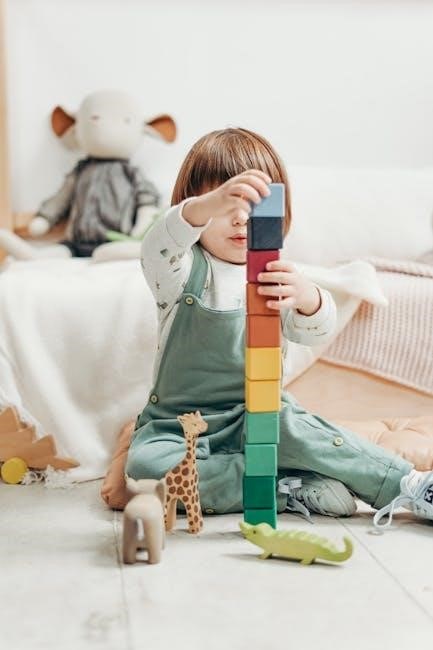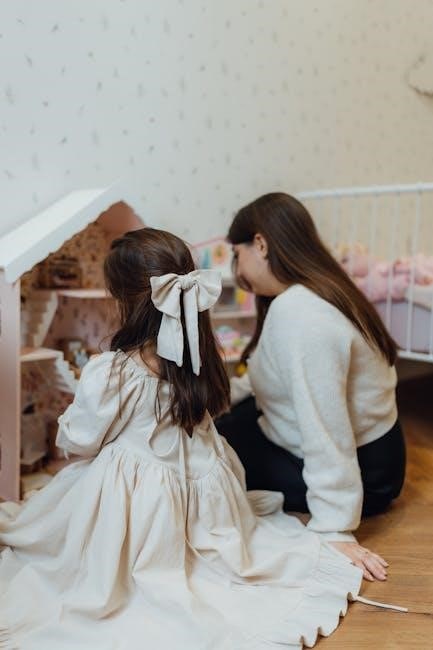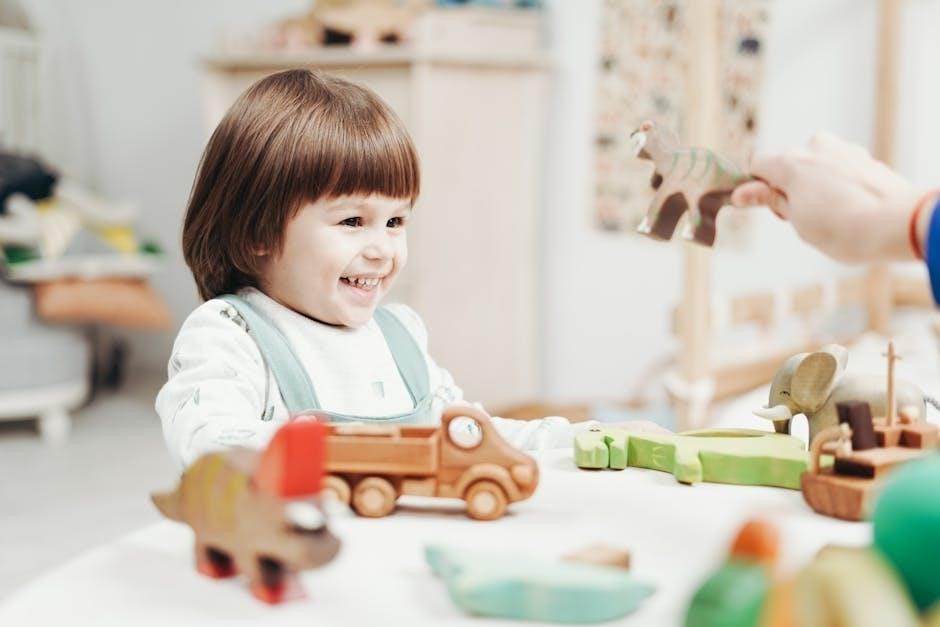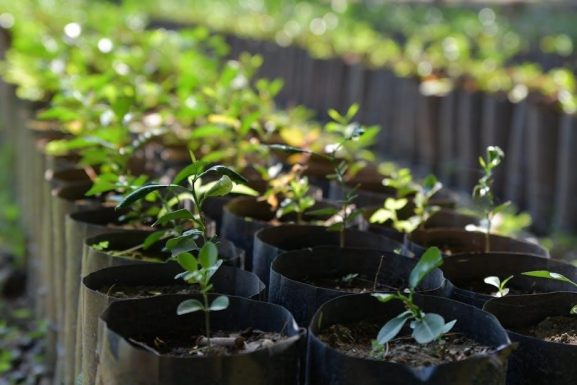The nursery curriculum, based on the Early Years Foundation Stage (EYFS), provides a holistic approach to early childhood education, fostering social, emotional, and cognitive development in children from birth to five. It emphasizes play-based learning, creativity, and essential life skills, ensuring a strong foundation for future academic success.
1.1 Overview of Nursery Education
Nursery education focuses on early childhood development, fostering social, emotional, physical, and cognitive growth in children aged 3-5. It emphasizes play-based learning, creativity, and exploration, preparing youngsters for formal schooling. The curriculum is designed to promote independence, curiosity, and foundational skills, ensuring a smooth transition to primary education while nurturing a lifelong love for learning.
1.2 Importance of Early Years Foundation Stage (EYFS)
The Early Years Foundation Stage (EYFS) is crucial for fostering holistic development in children, laying the groundwork for future academic and personal success. It focuses on building essential skills, encouraging curiosity, and promoting adaptability. By emphasizing personalized learning and creativity, the EYFS ensures children develop emotionally, socially, and intellectually, preparing them for lifelong learning and fostering a strong foundation for their educational journey.
Structure of the Nursery Curriculum
The nursery curriculum is structured around the Early Years Foundation Stage (EYFS), focusing on seven key areas of learning, blending play with structured activities to promote holistic development.
2.1 Areas of Learning and Development
The nursery curriculum is divided into seven key areas of learning and development: Personal, Social and Emotional Development; Physical Development; Communication and Language; Literacy; Mathematics; Understanding the World; and Expressive Arts and Design. These areas are interconnected, ensuring a balanced approach to learning, with a focus on play-based activities that foster creativity, curiosity, and essential life skills, preparing children for future challenges.
2;2 Key Skills and Competencies
The nursery curriculum focuses on developing essential skills such as communication, problem-solving, and emotional intelligence. Children learn to express themselves confidently, build relationships, and demonstrate curiosity about the world. These competencies are nurtured through play and hands-on activities, fostering creativity, resilience, and a love for learning. The curriculum ensures children are well-prepared with the skills needed for lifelong success and adaptability in a changing world.

Implementing the Nursery Curriculum
Effective implementation involves creating engaging, play-based activities and fostering creativity. Teachers use structured lesson plans and diverse resources to ensure a balanced and adaptive learning environment for young children.
3.1 Role of Teachers and Educators
Teachers and educators play a vital role in implementing the nursery curriculum by designing engaging activities, observing children’s progress, and adapting strategies to meet individual needs. They create a nurturing environment that fosters curiosity, creativity, and social skills, acting as role models and facilitators of holistic development. Their expertise ensures the curriculum is delivered effectively, promoting physical, emotional, and cognitive growth in young learners.
3.2 Learning Through Play
Learning through play is a cornerstone of the nursery curriculum, fostering creativity, problem-solving, and social interaction. Play-based activities, such as pretend play, art, and physical games, encourage children to explore, experiment, and develop essential skills. This approach nurtures emotional resilience, confidence, and a love for learning, aligning with the EYFS framework to promote holistic child development in a fun and engaging manner.

Physical Development in Nursery Curriculum
Physical development in the nursery curriculum focuses on enhancing motor skills, coordination, and overall physical well-being through structured and spontaneous play, aligning with EYFS guidelines to ensure children develop confidently and healthily.
4.1 Motor Skills Development
Motor skills development in the nursery curriculum focuses on refining both gross and fine motor abilities through play-based activities. Children engage in tasks like using tools, climbing, and balancing to enhance coordination and dexterity. These activities, aligned with EYFS guidelines, foster physical confidence and prepare children for more complex movements and skills, such as handwriting, in later stages of their education.
4.2 Outdoor Play and Physical Activity
Outdoor play is integral to the nursery curriculum, fostering physical activity and well-being. Activities like climbing, running, and team games enhance gross motor skills, coordination, and stamina. Exploring nature and engaging in seasonal outdoor experiences encourage curiosity and a connection with the environment, while promoting social interaction and emotional resilience among young children.
Cognitive Development in Nursery Curriculum
Cognitive development in nursery curriculum focuses on enhancing children’s thinking, problem-solving, and understanding of the world. Activities encourage curiosity, exploration, and foundational skills in math and literacy.
5.1 Problem-Solving and Critical Thinking
Problem-solving and critical thinking are essential components of the nursery curriculum, fostering children’s ability to explore, analyze, and resolve challenges. Through hands-on activities and play, children develop logical reasoning, creativity, and decision-making skills, preparing them for lifelong learning and intellectual growth. These experiences are tailored to nurture independence and confidence in young learners.
The nursery curriculum introduces basic math through counting, shapes, and sorting, while literacy is explored via storytelling, rhymes, and alphabet recognition. These activities are designed to be engaging and age-appropriate, laying the groundwork for formal education. Play-based learning encourages children to develop foundational skills in numeracy and language, fostering a love for learning and preparing them for future academic challenges.
Social and Emotional Development
The curriculum focuses on nurturing children’s ability to form relationships, communicate effectively, and understand emotions. It promotes self-awareness, empathy, and confidence, fostering a strong emotional foundation for lifelong well-being.
6.1 Building Relationships and Communication
Building relationships and communication skills are central to the nursery curriculum. Children learn to express themselves, listen, and empathize, fostering strong bonds with peers and adults. Group activities and role-play encourage collaboration, while educators model effective communication, helping children develop confidence in interacting with others. These skills lay the foundation for lifelong social and emotional well-being, enabling children to navigate relationships effectively in diverse settings.
6.2 Emotional Intelligence and Self-Awareness
Emotional intelligence and self-awareness are vital components of the nursery curriculum, helping children understand and manage their emotions. Activities like role-playing, group discussions, and storytelling encourage children to identify feelings and develop empathy. Educators model positive behaviors, guiding children to recognize and express emotions constructively. This fosters resilience, confidence, and healthy relationships, laying a strong foundation for mental well-being and personal growth.
Cultural Capital and Nursery Curriculum
Cultural capital in the nursery curriculum enriches children’s lives through exposure to arts, creativity, and diverse experiences, fostering an appreciation of different cultures and broadening their perspectives.
The nursery curriculum introduces children to various art forms, encouraging creativity through painting, music, and crafts. These activities foster self-expression, imagination, and fine motor skills, while exposing them to diverse cultural influences. Arts and creativity are integral to the EYFS framework, helping children develop confidence and a lifelong appreciation for creative expression.
7.2 Understanding Diversity and Inclusion
The nursery curriculum emphasizes the importance of diversity and inclusion, fostering respect for different cultures, backgrounds, and abilities. Activities such as storytelling, role-playing, and celebrating various festivals help children understand and appreciate diversity. This promotes empathy, equality, and a sense of belonging, preparing them to thrive in a global society and value individual differences as strengths.

Assessment and Progression
The nursery curriculum includes continuous assessments to monitor children’s development, ensuring they meet key milestones and are well-prepared for their transition to primary school.
8.1 Monitoring Developmental Milestones
Monitoring developmental milestones involves systematic observation and feedback, ensuring children progress steadily in areas like communication, physical skills, and emotional intelligence. This process helps identify individual needs and informs curriculum planning, fostering a personalized approach to early learning and development.
8.2 Transition to Primary School
The transition to primary school is a critical phase supported by nursery curriculum planning. Strategies include familiarizing children with primary school environments, building confidence, and fostering independence. Teachers collaborate with parents to ensure a smooth handover, providing detailed records of each child’s developmental progress to primary educators, ensuring continuity and readiness for the next educational stage.
Best Practices for Nursery Curriculum
Engaging parents through regular updates and involving them in learning activities enhances nursery education. Incorporating technology, like educational apps, fosters interactive learning while maintaining a balanced approach to screen time.
9.1 Engaging Parents in Early Learning
Engaging parents in early learning is crucial for their child’s development. Schools share nursery curriculum PDF guides, progress reports, and activity ideas, encouraging parents to support learning at home. Regular workshops and parent-teacher meetings foster collaboration, ensuring consistency between home and nursery environments. This partnership helps children thrive emotionally, socially, and academically, laying a strong foundation for future success.
9.2 Using Technology in Nursery Education
Technology plays a vital role in modern nursery education, enhancing learning through interactive tools and digital resources. Educational apps, multimedia content, and nursery curriculum PDF guides support early literacy, numeracy, and problem-solving skills. Balanced tech integration complements play-based activities, fostering engagement and creativity. Teachers are trained to use technology effectively, ensuring it enriches the learning environment while maintaining a focus on holistic child development.

Resources and Tools
Nursery curriculum PDF guides provide comprehensive frameworks for learning and development. Educational materials like art lessons, outdoor play policies, and interactive activities support diverse learning needs.
10.1 Nursery Curriculum PDF Guides
Nursery curriculum PDF guides offer comprehensive frameworks for early childhood education. These documents outline developmental milestones, learning goals, and activities across the 7 areas of the EYFS. They provide structured lesson plans, assessment tools, and examples of play-based learning strategies. Educators use these guides to monitor progress and ensure alignment with curriculum standards. Parents can also access these resources to understand their child’s developmental journey and support learning at home.
10.2 Educational Materials and Activities
Educational materials and activities in nursery curricula are designed to engage young learners through interactive and hands-on experiences. These include art projects, storytelling, sensory play, and outdoor activities. Resources like lesson plans, activity sheets, and digital tools support teachers in delivering structured learning aligned with EYFS standards. These materials cater to diverse learning styles, fostering creativity, problem-solving, and social skills, while promoting overall child development.

Challenges and Solutions
Challenges in nursery education include addressing learning gaps and supporting children with special needs. Solutions involve tailored strategies, inclusive practices, and collaborative efforts between educators and parents.
11.1 Addressing Learning Gaps
Learning gaps in nursery education often arise from developmental delays or inconsistent engagement. To address these, educators use personalized learning plans, formative assessments, and targeted interventions. Incorporating technology and creative activities helps bridge gaps, ensuring all children progress evenly. Parental involvement and continuous monitoring further support tailored strategies to meet individual needs effectively.
11.2 Supporting Children with Special Needs
Nurseries employ tailored strategies to support children with special needs, ensuring inclusive education. Personalized learning plans, adaptive resources, and trained staff cater to individual requirements. Collaborative efforts with specialists and parents create a nurturing environment, fostering social, emotional, and cognitive growth. Early identification and intervention are key to helping these children thrive alongside their peers.
A well-structured nursery curriculum lays the foundation for lifelong learning, fostering cultural capital, inclusivity, and emotional intelligence. Future trends emphasize technology integration and personalized learning for holistic development.
12.1 The Impact of a Well-Structured Nursery Curriculum
A well-structured nursery curriculum significantly enhances early childhood development, fostering personal growth, social interactions, and intellectual exploration. It builds a strong foundation for future learning, equipping children with essential skills like critical thinking, creativity, and emotional resilience. By promoting cultural capital and inclusivity, it prepares children for lifelong success, ensuring they thrive academically and socially in diverse environments.
12.2 Future Trends in Early Childhood Education
Future trends in early childhood education emphasize integrating technology, fostering cultural diversity, and prioritizing physical activity. There is a growing focus on personalized learning, higher qualifications for educators, and incorporating outdoor play to enhance development. These trends aim to create inclusive, engaging environments that nurture creativity, critical thinking, and emotional intelligence, preparing children for a rapidly changing world while ensuring holistic growth.
